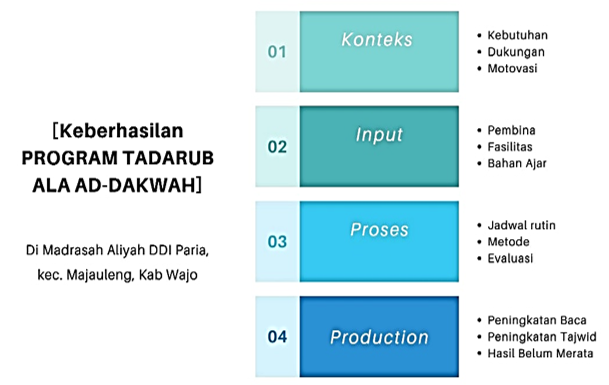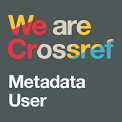Evaluative Framework CIPP Model for the Tadarub Ala Ad-Dakwah Program at Madrasah Aliyah School
DOI:
https://doi.org/10.51574/ijrer.v4i4.3607Keywords:
CIPP Model, Islamic High School, Program Evaluation, Qur'an Literacy, TadarubAbstract
The Ad-Dakwah-style tadarub program at Islamic High School, or Madrasah Aliyah DDI Paria, is an important effort to improve Qur'an literacy and build students' religious character. However, the effectiveness of this program has not been comprehensively evaluated, requiring a comprehensive evaluative framework. This study intends to evaluate the tadarub program using the CIPP (Context, Input, Process, Product) Model, which assesses the program's context, input, process, and product aspects. The research method used was a combined approach with data collection through interviews, observations, document analysis, and questionnaires with participants and program instructors. The evaluation results indicate that the tadarub program is relevant to the needs of participants and the school environment and supported by adequate human resources and facilities despite the limited number of instructors. The implementation process was structured but faced obstacles such as participant absence and time constraints. The program's products showed significant improvements in Qur'an reading skills and basic tajweed understanding, although the results were not evenly distributed across all participants. Based on these findings, recommendations include increasing the number of instructors, enriching teaching materials, more flexible scheduling, and ongoing evaluation to optimize the program's impact. This research contributes to the development of an adaptive and comprehensive evaluation of religious programs based on the CIPP model.
References
Alanshori, M. Z., Maulidi, A., Muhlisin, A., Kusaeri, K., & Suparto, S. (2025). The Application of the CIPP Evaluation Model in Educational Programs in Indonesia. Scaffolding: Jurnal Pendidikan Islam dan Multikulturalisme, 7(2), 103-122. https://doi.org/10.37680/scaffolding.v7i2.7390
Alfian, M., Herningrum, I., & Putra, P. H. (2025). Perspective of Islamic Religious Education Study Program Students on the Islamic Education Curriculum in Indonesia. Scaffolding: Jurnal Pendidikan Islam dan Multikulturalisme, 7(1), 578-594. https://doi.org/10.37680/scaffolding.v7i1.7146
Alsya'bani, I. S., Madjid, A., & Shodiq, S. F. (2025). Analysis of CIPP Evaluation Model on Religious Programs in Schools: Systematic Literature Review. JURNAL EDUSCIENCE, 12(3), 605-620. https://doi.org/10.36987/jes.v12i3.6873
Al Munawarah, Z., Mania, S., & Rasyid, M. N. A. (2024). Evaluasi Program Magang Guru Berbasis Cse-Ucla Di Smk Negeri Balanipa Pusat Keunggulan Kabupaten Polewali Mandar. EDU RESEARCH, 5(4), 842-852. https://iicls.org/index.php/jer/article/view/457
Al-Shanawani, H. M. (2019). Evaluation of self-learning curriculum for kindergarten using Stufflebeam’s CIPP model. Sage Open, 9(1), 2158244018822380. https://doi.org/10.1177/2158244018822380
Antariksa, W. F., Fattah, A., & Utami, M. A. P. (2022). Evaluasi Program Pendidikan Pesantren Mahasiswa Model Cipp (Context, Input, Process, Product). Evaluasi: Jurnal Manajemen Pendidikan Islam, 6(1), 75–86. https://doi.org/10.32478/evaluasi.v6i1.848
Apriyani, N., Rasyid, M. N. A., Mania, S., & Mahyuddin, M. (2025). Evaluasi Model CIPP terhadap Pendidikan Karakter dalam Program Inklusi di Taman Kanak-Kanak Islam. Didaktika: Jurnal Kependidikan, 14(2 Mei), 2001-2016. https://doi.org/10.58230/27454312.2174
Aripin, S. A. S., & Nurdiansyah, N. M. (2022). Modernization of Education: A New Approach and Method in Learning Islamic Religious Education. TADRIS: Jurnal Pendidikan Islam, 17(1), 100-117. https://doi.org/10.19105/tjpi.v17i1.5916
Aristya, S. (2023). CIPP: Implementasi Model Evaluasi Pendidikan. Jurnal Evaluasi Dan Pembelajaran, 5(1), 1–72. https://doi.org/10.52647/jep.v5i1.84
Chanifah, N., Hanafi, Y., Mahfud, C., & Samsudin, A. (2021). Designing a spirituality-based Islamic education framework for young muslim generations: a case study from two Indonesian universities. Higher Education Pedagogies, 6(1), 195-211. https://doi.org/10.1080/23752696.2021.1960879
Dizon, A. G. (2023). Historical development of CIPP as a curriculum evaluation model. History of Education, 52(1), 109-128. https://doi.org/10.1080/0046760X.2022.2098390
Fitriani, Y. dkk. (2024). Evaluasi Program Tahfidz Kurikulum Utrujah Menggunakan Model CIPP pada Sekolah Islam Markaz Ashabul Qur’an. An-Nahdlah: Jurnal Pendidikan Islam, 4, 69–77. https://doi.org/10.51806/an-nahdlah.v4i1.135
Gerayllo, S., Vakili, M., Jouybari, L., Moghadam, Z., Jafari, A., & Heidari, A. (2025). Using the CIPP Model to elicit perceptions of health professions faculty and students about virtual learning. BMC Medical Education, 25(1), 166. https://doi.org/10.1186/s12909-025-06747-1
Gresik, U. M., Mohamad, O., Arfa, M., Gresik, U. M., & Islam, P. A. (2024). Strategi Pembelajaran Pendidikan Agama Islam Dalam Menumbuhkan Kesadaran Tadarus Al Qur’an Siswa. TARLIM Jurnal Pendidikan Agama Islam, 7(2), 221-229. https://doi.org/10.32528/tarlim.v7i2.2440
Huang, S. H. (2025). Evaluating the English for General Purposes (EGP) program at a Taiwanese University: A CIPP (context, input, process, and product) model study. Evaluation and Program Planning, 102662. https://doi.org/10.1016/j.evalprogplan.2025.102662
Kosim, M., Muqoddam, F., Mubarok, F., & Laila, N. Q. (2023). The dynamics of Islamic education policies in Indonesia. Cogent Education, 10(1), 2172930. https://doi.org/10.1080/2331186X.2023.2172930
Latief, S., Sari, Y. A., Yusuf, M., Armila, A., & Hidayat, R. E. (2021). The Development of Islamic Education and Strengthening of National Education System of Indonesia. International Journal on Advanced Science, Education, and Religion, 4(2), 86-99. https://doi.org/10.33648/ijoaser.v4i2.105
Lippe, M., & Carter, P. (2018). Using the CIPP model to assess nursing education program quality and merit. Teaching and Learning in Nursing, 13(1), 9-13. https://doi.org/10.1016/j.teln.2017.09.008
Mania, S., & Rasyid, M. N. A. (2024). Efektivitas Pelaksanaan Program Baca Tulis Al-Qur’an Dengan Model Evaluasi Cipp di Ma’had Al-Jami’ah Iain Ambon. al-Iltizam: Jurnal Pendidikan Agama Islam, 9(2), 229-248. https://doi.org/10.33477/alt.v9i2.6936
Masturin, M. (2022). Development of Islamic religious education materials based on religious moderation in forming student character. Munaddhomah: Jurnal Manajemen Pendidikan Islam, 3(4), 346-355. https://doi.org/10.31538/munaddhomah.v3i4.310
McDavid, J. C., Huse, I., & Hawthorn, L. R. (2018). Program evaluation and performance measurement: An introduction to practice. Sage Publications.
Molope, M., & Oduaran, A. (2020). Evaluation of the community development practitioners’ professional development programme: CIPP model application. Development in Practice, 30(2), 194-206. https://doi.org/10.1080/09614524.2019.1650894
Musolin, M., Fauzi, F., & Muflihin, H. (2023). Evaluating Curriculum at Madrasah Aliyah: Applying the Context, Input, Process, Product (CIPP) Model. AL-ISHLAH: Jurnal Pendidikan, 15(4), 6737-6748. https://doi.org/10.35445/alishlah.v15i4.2516
Nurhakim, H. A., & Fahruddin. (2022). Evaluasi Program Pembelajaran Sejarah Daring Dengan Model Cipp. Jurnal Evaluasi Pendidikan, 13(2), 111–118. https://doi.org/10.21009/jep.v13i2.27456
Nurhasanah, E., Ratnaya, I. G., Parwata, I. G. L. A., & Budhyana, I. D. A. M. (2025). The Implementation of Context, Input, Process, Product Evaluation Model for Assessing Educational Programs. JETAL: Journal of English Teaching & Applied Linguistic, 7(1), 55-71. https://doi.org/10.36655/jetal.v7i1.1925
Putra, H. A. D., & Fitrayati, D. (2021). Efektivitas Model Pembelajaran Blended Learning Untuk Meningkatkan Keterampilan Berpikir Kritis Peserta Didik Pada Pelajaran Ekonomi. Edukatif : Jurnal Ilmu Pendidikan, 3(4), 1765–1774. https://doi.org/10.31004/edukatif.v3i4.676
Qalbi, R. N. (2022). Efektivitas Pembiasaan Tadarus Alquran Pada Prestasi Belajar Mata Pelajaran Penndidikan Agama Islam Siswa Kelas VI SD Muhammadiyah Wiwitan Kecamatan Lamasi Kabupaten Luwu. Islamic Journal: Pendidikan Agama Islam, 1(01), 117-124.
Rama, A., Ambiyar, A., Rizal, F., Jalinus, N., Waskito, W., & Wulansari, R. E. (2023). Konsep model evaluasi context, input, process dan product (CIPP) di sekolah menengah kejuruan. JRTI (Jurnal Riset Tindakan Indonesia), 8(1), 82. https://doi.org/10.29210/30032976000
Rambe, E. (2017). Penerapan metode dakwah orang tua dalam menanamkan nilai-nilai agama kepada anak di Desa Aek Goti Kec. Silangkitang Kab. Labuhanbatu Selatan. WARAQAT: Jurnal Ilmu-Ilmu Keislaman, 2(2), 13-13. https://doi.org/10.51590/waraqat.v2i2.64
Santiyadnya, N. (2021). The effectiveness of CIPP model’s implementation in secondary school. In Journal of Physics: Conference Series (Vol. 1810, No. 1, p. 012071). IOP Publishing. https://doi.org/10.1088/1742-6596/1810/1/012071
Sholeh, M. I., Haris, M., Shobirin, M. S., Wahrudin, B., Muzakki, H., Ismail, T., & Ali, H. (2024). The Role of Teachers in Increasing Students' Learning Motivation in Islamic Religious Education. Jurnal Pendidikan Agama Islam, 21(2), 421-441. https://doi.org/10.14421/jpai.v21i2.8846
Tuna, H., & Başdal, M. (2021). Curriculum evaluation of tourism undergraduate programs in Turkey: A CIPP model-based framework. Journal of Hospitality, Leisure, Sport & Tourism Education, 29, 100324. https://doi.org/10.1016/j.jhlste.2021.100324
Tuna, M. H. (2022). The professionalisation of Islamic religious education teachers. British Journal of Religious Education, 44(2), 188-199. https://doi.org/10.1080/01416200.2021.1999905
Umam, K. A., & Saripah, I. (2018). Using the Context, Input, Process and Product (CIPP) model in the evaluation of training programs. International Journal of Pedagogy and Teacher Education, 2, 19-183. https://doi.org/10.20961/ijpte.v2i0.26086
Warju, W. (2016). Educational program evaluation using CIPP model. Invotec, 12(1). https://ejournal.upi.edu/index.php/invotec/article/view/4502
Wijaya, I., Mania, S., & Rasyid, M. N. A. (2025). Evaluasi Program Daurah Online Metode Ummi untuk Orang Tua Santri Digiss Pangkep Menggunakan Model Kirkpatrick. Esensi Pendidikan Inspiratif, 7(1), 49–66.

Downloads
Published
How to Cite
Issue
Section
License
Copyright (c) 2025 Gusni Gusni, Sitti Mania, Muhammad Nur Akbar Rasyid

This work is licensed under a Creative Commons Attribution-ShareAlike 4.0 International License.









1.png)













